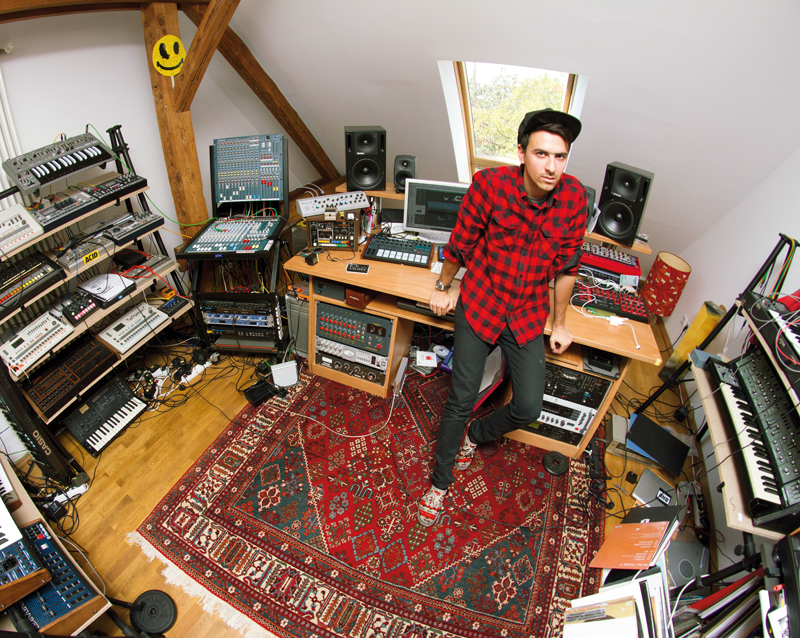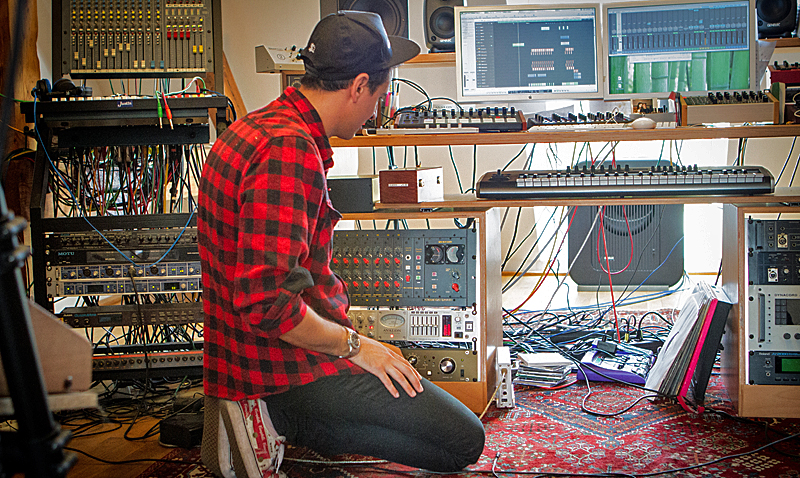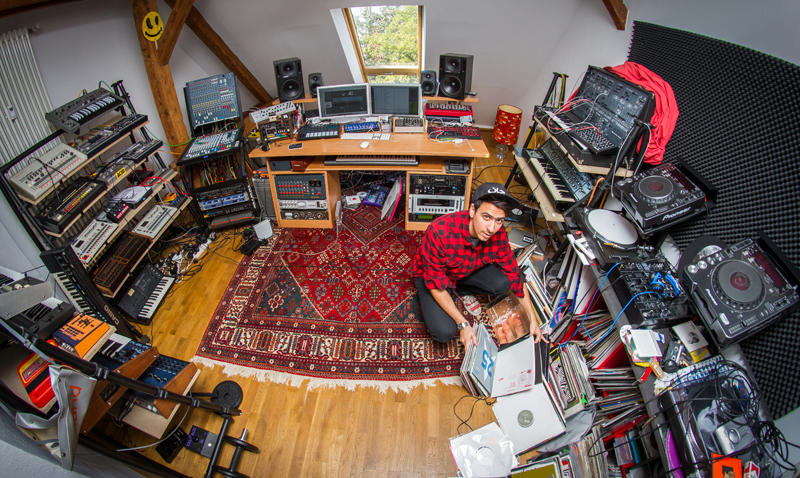Boys Noize video studio tour and interview with Future Music
Watch as FM are shown Boys Noize HQ
Want all the hottest music and gear news, reviews, deals, features and more, direct to your inbox? Sign up here.
You are now subscribed
Your newsletter sign-up was successful
It'd be no exaggeration to suggest that Boys Noize has been one of the most prolific artists in Electronic music over the past five years. Rising from a Hamburg-based DJ to producer, remixer, artist and label owner, Alex Ridha has lent his production skills to genre-crossing artists like Santigold, Gonzales, Spank Rock, Kelis and Kano, while giving his own spin tohile giving his own spin to Depeche Mode, Tiga, Feist, Daft Punk, Chemical Brothers and many more.
As an artist, his debut album Oi Oi Oi became a landmark record in a new wave of Electronic music dominance and since, he's been padding out his studio with a mix of classic synths, drum machines and modern tools for creating, mangling and destroying sounds and samples.

His latest LP Out of the Black takes the Techno-cum-Electro sound Boys Noize has made his own and pulls in influences from his work across multiple genres. The result is an album that puts him on a producer pedestal, managing to achieve a sonic depth, tightness and width while still delivering on the dancefloor. Speaking of the dancefloor, Boys Noize's updated live show takes on a new form, redefining his recent tours.
Last summer, Future Music took a trip to Berlin and took a glimpse inside Boys Noize's somewhat chaotic studio, which had spiralled outwards and upwards along with his career. Since then, he's moved to a brand new home with a brand new setup on the top floor of a beautiful building in central Berlin. With a new album, a new live show and new kit already piling up, we figured it was time to revisit his studio to talk about his collaborations, his take on DJing in 2012 and the joys and woes of the ARP2600...
You've moved studios since we were last here.
"Yeah I'm really happy now. It's still not the best space, but the old one was such a mess. Any time someone came to record vocals or anything like that, people were walking through the studio to go to the toilet and stuff, so it wasn't ideal. [Laughs] But I did a lot of amazing music there; I think the vibe was good, it was just too chaotic. Now, I've found a great place. It's still at home, which is really important for me - I can't work within a set time - most of the stuff on the new album was done at night. I wouldn't be able to make music nine-to-five."
"It seems like a lot of the music out there is 'functional'. It's made with something in mind: to make people go crazy. It's too easy"
You took some time off touring for this album right?
"Yeah, I didn't do any festivals this summer, just one or two exclusive ones. The plan was to do one DJ gig a month. It was great to only make music and get into a creative mood again - going to the studio every day, recording stuff and having fun. In the lasttwo years, I've mostly done production work for other people and I've had a lot of ideas for my own stuff building up over that time. But I never had the chance to go back in the studio to do what I want because I was either working with others or out on the road DJing."
How did the other production work inform your sound on the new album?
"Well, one of the biggest questions for me when I started working on this album was 'Should I get big names to feature on it?' like everyone is doing right now. It benefits everyone involved and even though've been lucky enough to meet a lot of different artists and I could have asked a lot of people, I didn't feel like the music coming out of a lot of collaborations was really me.I don't know if I could get up on stage with a vocalist and perform a song. I'm more into warpingvocals and putting effects on them; those are the types of vocals that fill up my tracks. So, after I'd produced and worked with other artists, I decided I wasn't going to try and write 'songs' for the next Boys Noize album and that it was going to be more about sounds and textures.Plus, at the moment, it seems like a lot of the music out there is 'functional'. It's made with something in mind: to make people go crazy. It's too easy. For me that's no fun. But I don't think about where it's going to end up too much, I just try and keep it as intuitive as possible."
Want all the hottest music and gear news, reviews, deals, features and more, direct to your inbox? Sign up here.
"Before, in my mind the producer was always the guy who made the music or made the beats, but there's a lot more to it than that"
What was the one technique you took away frommaybe working with acoustic instruments, or vocalists, that you applied to your own music?
"I definitely learned a lot about being a producer in the classic sense. Before, in my mind the producer was always the guy who made the music or made the beats, but there's a lot more to it than that. It's about being sensitive to what other artists want and also being a guide. But because I learned how to produce on the fly rather than learning the traditional methods, I learned a lot about techniques from those projects too.The importance of panning was definitely something I took away from them. On all my old remixes everything was just centred! [Laughs] Now I'm very careful about the stereo image and hard-panning different parts. I think if you have a rough understanding of the physics of music and you have two signals doing the same kind of thing, you want to give them more room to do it.
"Another trick I just learned is, if you send a signal to a buss with whatever delay you want to have and then put a phaser afterwards, it really opens it up and makes it wide. Logic's Sample Delay is good for that too, when you just delay one channel by a few milliseconds. I had some problems with that though, because you can get some phasing and comb filtering if you make the delay too short so you've got to be careful."
"A good DJ has a feel for moments - they'll play whatever to get people dancing 'cause that's what it's about at the end of the day"
How have you found your DJ shows changed over the past few years?
"The first reaction to MP3s, free music and new ways of DJing was always 'It was better before, why don't people buy the music, I've spent so much time in the studio' and so on. But you can't blame a whole generation for growing up with free music. The real challenge is making them aware of the fact that an MP3 is just a digital file that will end up on some hard drive somewhere. Taking a record out, looking at its sleeve, putting it on from start to finish, that has value and memories attached to it.The only thing I really feel a bit sad about is that you can't discover something and have it for your own anymore. There have been a lot of styles that die off so quickly because once it's out, it's out everywhere and everyone knows it.
"I started off DJing for that reason; to listen to and play music no one else was listening to. It always felt good to have something for my own and to feel special about it. Electro Clash died off really fast, but it was still around for like four years, the DJs just decided not to play it anymore. Now it's just a question of months. The producers change so quickly too, so now it seems like everyone is doing Deep House. Some DJs will always do what they want no matterwhat, and they don't care if anyone likes the music. A good DJ has a feel for moments - it doesn't matter what style. They'll just play whatever to get the people dancing because that's what it's about at the end of the day. Otherwise they might as well be DJing in a museum." [Laughs]

Do you think crowds being more informed now - as they have access to a lot of the same resources as DJs - means that they're less open to things they don't know?
"Yeah that might be a consequence for sure. It's not like you're finding a record at the back of a dustyrecord store - there's a good chance most people will know the tracks. When I was working in a record shop, we always got the test pressing orthe promo, and we used to play the record until everyone else started playing it. For me, the most exciting part of being a DJ is playing music peopledon't know. I just don't get why anyone would want to go to the club and listen to the same music they do at home or on the radio. In the States you can see it clearly that Electronic music has become mainstream.
"There's nothing exciting about playing everything people want to hear and playing 'the hits'. I could give anyone all those same tracks and they could just do the exact same job. I would give up DJing if I hadto play 'the hits' all the time. All of the things DJs are expected to do now - fireworks, visuals, etcetera- it's just so tiring. It's not about the music.Although, my live show will have a production too.[Laughs] Though it won't be too over the top."
Compression is a big part of your sound, especially on tracks like Missile. What compressor did you use for that track and what settings do you like for master buss compression?
"I used my Prime 4000 compressor on that track, which is a model of an SSL and it sounds really nice. On the buss in my DAW, I usually use the Duende SSL Buss Compressor. I like to go a bit harder when mixing on the buss to get the mix pumping. The settings I use depend on the track but usually it's a low threshold, a ratio of about four-to-one and I usually set the SSL's release to automatic."

Which three plug-ins and three synths or drum machines that make it onto every track?
"The Elektron Machinedrum, Elektron Octatrack and the [Roland] Jupiter-6 are my favourite hardware machines. To be honest, I love pretty much all the UAD-2 plug-ins, Native Instruments' Massive and Kontakt and Sugar Bytes Effectrix or Turnado. I think they all make it on to most tracks, in one way or another."
This album has a more 'acoustic' drums approach on some tracks, with a Hip Hop sampling feel almost, especially on What U Want and Rocky 2. Was that intentional?
"Yeah for sure, the idea behind those drums was to make it feel less generic and more organic and live-sounding. Because I've used some digital sounds in those tracks I thought the real drums made it sound more balanced. I usually samplemy drums straight from vinyl - that's what I've been doing for 15 years now so I've got a huge library of drum sounds I can choose from."
What are your favourite tools for drum processing?
"Maybe a mix of gating and compression. I love to tighten up drums with the gate and then shape them and give them more energy with some compression, which works better on less modern drums that I've sampled.Gating is something people usually don't think to use on samples but it's really important for getting rid of any noise before you compress and making all the drums sound like they're coming from the same space."
What piece of studio kit would you love to get next?
"Maybe the Eventide H3000 Ultra Harmonizer for processing drums and vocals."
Whose productions are you loving right now?
"There are a lot of great producers around at the minute, but I really love SCNTST, Jimmy Edgar, LE1F, Blawan, Djedjotronic and of course, Jacques Lu Cont."


Future Music is the number one magazine for today's producers. Packed with technique and technology we'll help you make great new music. All-access artist interviews, in-depth gear reviews, essential production tutorials and much more. Every marvellous monthly edition features reliable reviews of the latest and greatest hardware and software technology and techniques, unparalleled advice, in-depth interviews, sensational free samples and so much more to improve the experience and outcome of your music-making.
